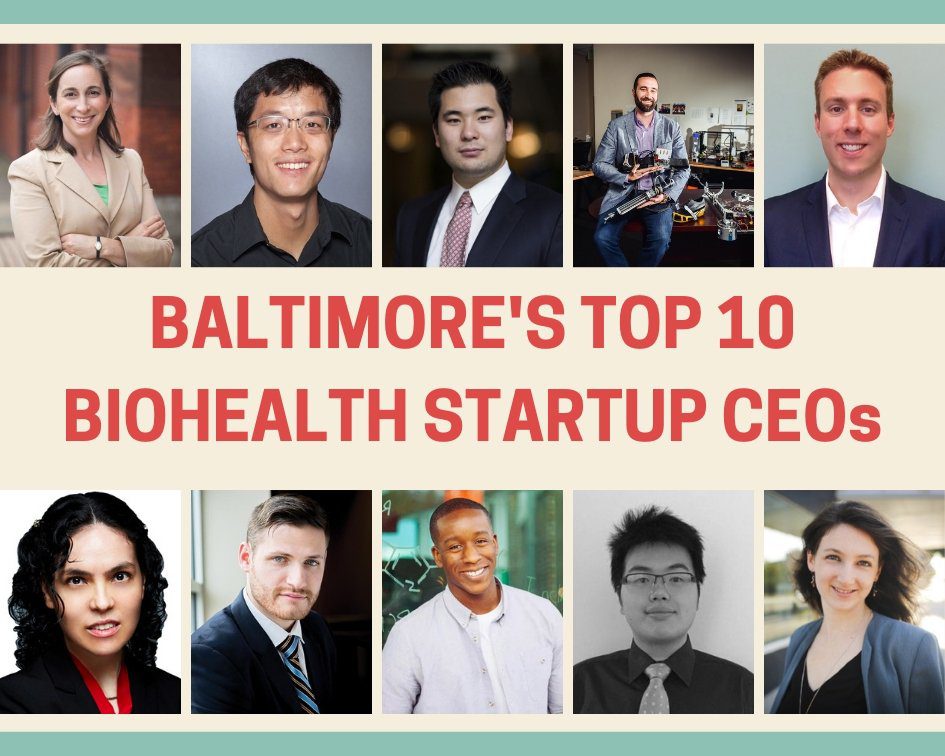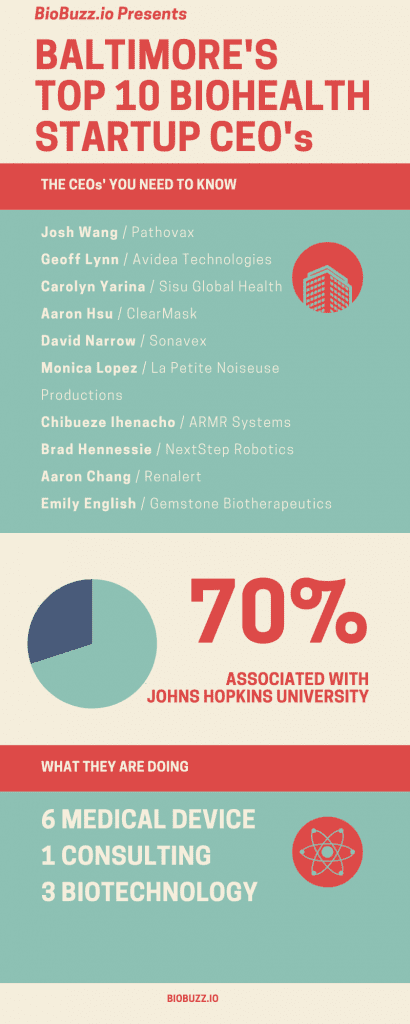
Baltimore’s Top 10 BioHealth Startup CEOs
April 10, 2019
Baltimore is brimming with entrepreneurial talent. A new generation of CEOs and inventors are emerging right here in Baltimore with companies that are revolutionizing the life science & healthcare industries. The local community of universities and investors, coupled with the broader assets of the BioHealth Capital Region, has provided a lush ecosystem for innovators to take their ideas to the next level.
New startup founders and CEOs draw on the experiences of fellow entrepreneurs in what has been dubbed, the Founders Network. Having a trusted support system for knowledge transfer and inspiration has been invaluable to many of these CEOs. TEDCO has been an important part of this resource network, facilitating monthly roundtables, mentorship, and advisory services, in addition to the various investment programs that have been the source of early capital for many of their ventures.

These CEOs and their teams have been inventing everything from novel vaccines and therapeutics to groundbreaking medical devices and equipment. We’ve been following the progress of these companies and their founders, many since the beginning, and are ready to spotlight the ones that are on the rise. Without further adieu;
Here are Baltimore’s Top 10 BioHealth Startup CEOs
1. David Narrow – Sonavex
Last month, David Narrow and team received FDA 510(k) clearance for the first of its kind ultrasound technology for blood flow monitoring. Ultrasound is the most effective way to detect soft tissue blood flow in patients, but is often left unutilized because it requires a trained eye to read results. Sonavex has created the EchoSure system to put real time quantitative data and image monitoring in the hands of surgeons and bedside nurses, wherever they are.
Sonavex’s EchoMark is placed inside of a patient during surgery to serve as a blood vessel marker in high risk areas. The marker will send alerts directly to medical professionals when blood flow drops below a set threshold, often indicating a clot. EchoSure is able to detect blood vessel constriction long before clinical signs would appear, allowing early intervention and improving patient outcomes.
At the age of 28, Sonavex CEO-Founder David Narrow, has founded two medical device companies and is on the cusp of bringing a new ground-breaking, life saving device to market. During his time as an undergrad at University of Rochester he created his first company MonoMano Cycling, to create tricycles for patients that have suffered from strokes and can only use one hand. Narrow has been able to draw on his experiences from his first company, but has still had plenty to learn on the path to bring EchoSure to market. Whatever challenges came their way, Narrow and team remained confident and determined to prove naysayers wrong. In a Q&A with Johns Hopkins Magazine, Narrow attributed their success to perseverance “We refuse to take no for an answer. When you’re doing something new or different or risky, you get a ton of negative feedback saying that you’re going to fail…But we’re stubborn—those pieces of negative feedback just motivate our team to work harder and say, ‘We will prove that this is possible and we will be successful.’”
2. Carolyn Yarina – Sisu Global Health
Sisu Global Health is changing the landscape of medical devices in emerging markets. Their focus is to create cutting-edge life saving tools for doctors and patients of the developing world, with their needs in mind. Their first product, Hemafuse, gained regulatory approval in Kenya and Ghana and has been helping to combat the 50-60% donor blood shortage across Africa.
Carolyn Yarina, CEO, and her co-founders Gillian Henker and Katie Kirsch, are three pieces of a puzzle coming together to combine their expertise and create change. Their goal is to revolutionize the way that medical devices are designed for emerging markets by creating the best possible commercial success with their model. US companies have tried to break into the emerging markets by taking their medical devices, pairing off features, and selling them at a lower cost. This does not work because our infrastructure is completely different and the medical professional and patient needs are not taken into consideration.
Hemafuse is a device that is able to collect and filter a patient’s own blood to be transfused back to the patient during surgery, without using electricity. Donor blood isn’t always available in many parts of the world, and if it is, it’s quite costly. Surgeries require at least two units of transfused blood for one patient. The cost of a Hemafuse device is comparable to one unit of donor blood, but the device can salvage multiple units for one patient. It can then be autoclaved and reused again over multiple surgeries for different patients, saving hundreds of dollars for every surgery.
When asked what her secret to success is, Yarina modestly attributes the company’s many achievements to her co-founders and team members, “Our team might be small, but they are powerful. ‘Sisu’ means persevering in the face of adversity. This is a quality of the people that we design for, but also a belief we hold within ourselves. Every member of our team has the same tenacity and believes in what we’re doing.”
3. Emily English – Gemstone Biotherapeutics
Gemstone Biotherapeutics is breathing life back to an industry that has been stagnant for more than two decades. Gemstone biotherapeutics, in collaboration with Johns Hopkins University and University of Pennsylvania, has developed an advanced wound care product using EMR technology. Their line of dermatology products, exclusively IP licensed with Hopkins, targets surgical and chronic wounds such as burns, and cosmetic wound care like hair restoration.
The technology uses an EMR scaffold, a 3D structure that stimulates the local cell environment and extracellular matrix, to activate regenerative properties and reduce inflammation during healing. “When we use the term regenerate…we’re talking about tissue that comes back without scarring, with restoration of hair follicles and sebaceous glands and with all of the normal structures you’d expect to see in healthy, living skin”. Their novel platform technology can be tweaked and tailored for specific wound applications by easily incorporating therapeutics, cells, and growth factors.
In 2018 the start up secured $300k in funding from the TEDCO MD Stem Cell Fund and named a new CEO to drive commercialization. Emily English previously held the title of Program Manager at the Johns Hopkins Applied Physics Lab where she managed a $6M program, overseeing 30-40 scientists. Her time as a bench chemist at APL armed her with all of the technical skills needed to create a successful pipeline of products. While her role as a project and program manager gave her the experience she would need to run a startup company.
Gemstone Biotherapeutics plans to submit their medical device package to the FDA early 2019. Upon receiving 510(k) approval they will begin scaling up manufacturing and proceed to collect additional pre-clinical data for proof of concept and efficacy.
4. Josh Wang – PathoVax
PathoVax, lead by CEO-founder Josh Wang, is a Johns Hopkins start up on track to develop the first-ever broad-spectrum HPV vaccine. The company has raised $6.3M in funding to date, including a $300k NIH SBIR award this year to help move their vaccine from the lab into the clinic. There are vaccines on the market that combat certain strains of the virus, but a large percentage of the population is still unprotected. Wang’s goal is to provide vaccination against at least 27 strains of HPV, including all 15 high-risk cervical cancer-causing types. If successful, they will create the first single-dose vaccine that reduces the large economic healthcare burden and social stigma resulting from the incomplete protection of current HPV vaccines
PathoVax is hiring – Research Associate, Immunology
Wang was born and raised in Singapore, made his way to the UK for undergrad, then arrived in Baltimore, MD for his graduate degree in Pathobiology at Johns Hopkins University. Here he met his co-founder and developed an interest in bio-entrepreneurship, together they made the decision to take their research in the lab to the next level. He and his co-founders attribute their successful business strategy to the support they have received from their large network of mentors. The team holds mentorship at the highest esteem, Wang himself has been very involved in the Hopkins community and currently serves as a mentor to local student venture capitalists through A-Level Capital.
5. Geoffrey Lynn – Avidea Technologies
Founder and CEO Geoffrey Lynn is a multifaceted scientist-entrepreneur. His journey has taken him through programs at Oxford, the NIH Vaccine Research Center, and Johns Hopkins, he is now working to combine these experiences to bring cutting-edge drug delivery solutions to market. Science is comprised of many languages like chemistry, molecular biology, physics, and so on. Most know the fundamentals of each, but Lynn is fluent in many. His unique background allows him to marry the sciences behind immunology and chemistry, providing the foundation for Avidea’s technology.
As if this wasn’t impressive enough, he is also business savvy, able to translate his science into the right business strategy for investors without losing them in the technical abyss. The exciting work at Avidea recently attracted veteran CEO, Bill Enright formerly of Altimmune, who has joined the team as Lynn’s new Chief Business Officer. Avidea was also the first tenant at JHU’s FastForward innovation space, where it still resides today.
“Innovation happens best in a diverse setting”
~Geoffrey Lynn
Avidea is proof of that. His expertise in these different fields of science has allowed him to bring two very different pieces of the puzzle together to create a nanoscaffold drug delivery platform. Lynn and his team are working to find a way to apply the same principle that a vaccine uses to create an immunization against a virus, to immunotherapy to treat cancer and infectious diseases. Lynn’s understanding of polymer chemistry and the immune system has allowed him to bridge the gaps of knowledge in different labs and provide solutions to problems that would otherwise be missed.
6. Aaron Hsu – ClearMask
Aaron Hsu and his team are bringing clarity to patients and making healthcare more human. Every day patients who are deaf and hard of hearing or have language barriers are left in the dark when they step into an operating room. About 55% of communication is nonverbal, and today surgical masks cover about half of a person’s face. This leaves a large part of the conversation up for interpretation. ClearMask is creating transparent face masks to bring comfort, assurance, and improved outcomes to patients.
Hsu did not set out to be an entrepreneur or pioneer new medical devices for healthcare. After graduating from Johns Hopkins he was applying to medical school when his personal and business partner, who is deaf, endured a traumatic patient experience prior to surgery. He imagined that this was probably common for a lot of patients and that someone somewhere was working on the solution. After extensive research, he concluded that help was not on the way, and withdrew his medical school applications to launch this journey. Since then, ClearMask has been recognized in the 20 top startups out of 3,000 at StartupGrind’s Global Conference, and has been accepted into TEDCO’s mdPACE program to gain FDA approval. Hsu and his team are expected to commence with product launch later in 2019.

7. Chibueze Ihenacho – ARMR Systems
ARMR Systems has designed the first wearable hemorrhage control system to stop bleeding anytime, anywhere. 1 in 4 preventable military deaths are from non-compressible hemorrhage injuries, meaning that due to the location of the injury they cannot be stabilized with a traditional tourniquet. On the battlefield medical attention is not always readily available, and without proper equipment a fatal bleed out can occur in as little as two minutes.
ARMR Systems Founder and CEO, Chibueze Ihenacho, and his team want to give every soldier the opportunity to become a medic. Their device, currently in the prototype stage, is a harness that be configured according to the injured area and acts as a small airbag to stop arterial blood flow. This low cost, low weight device can quickly be applied and activated by a fellow soldier, or even on themselves, and can simultaneously treat upper and low body injuries.
Ihenacho graduated with a biotechnology degree from Georgia Institute of Technology and quickly got involved with the local startup community. Since then, he has received the Georgia Technologies Alvin M. Ferst Leadership and Entrepreneur Award and was recognized by Entrepreneur Magazine as one of Magic Johnson’s 32 under 32. Ihenacho has combined his technical knowledge and passion to build a vast network of physicians, engineers, and investors to tap from Atlanta, to DC, all the way up to Boston. ARMR Systems was born out of the MassChallenge incubator in Boston, but early last year the company moved its headquarters to Baltimore to join the ever growing startup scene here in Maryland. Ihenacho and team quickly tapped into the local ecosystem and landed some attractive funding including a $100k investment from TEDCO.
8. Monica Lopez – La Petite Noiseuse (LPN) Productions
What does it mean to be human? This is the question that Monica Lopez is helping companies and organizations around the world to answer. Lopez has spent her life studying both science and the arts, she believes the two are inextricably linked and must be studied under the same microscope to solve the problems of the future. Their business venture began with extensive research of human behavior, cognition, and creativity. How does one turn this into a profitable business, you might ask? With the rise of Big Data, Artificial Intelligence and other transformative technologies that are beginning to enter society, defining what it means to be human is more important than ever. LPN Productions has designed a proprietary methodology, based on their empirical research findings, that they apply into R&D, product development, and design business strategy to help companies create human-centered solutions and products.
The French company name, La Petite Noiseuse Productions, translates to “The Little Trouble Maker Productions”. Lopez knows that combining these two different schools of thought is disruptive to the approach that many industries currently take, causing trouble. LPN Productions markets their consulting services to many industries including healthcare, cybersecurity, autonomous systems, education, and entertainment. Lopez is hired to keynote industry conferences around the world and across the US, and is getting the attention of top global corporations who are beginning to see the urgent importance of the human element in their approach.
LPN Production’s solutions help health tech companies to design patient centered products, such as an app that the user feels they are gaining something from while still collecting the data the company needs. AI software is sophisticated enough to recognize objects, but it lacks the human understanding of context and common sense. Their methodology is applied to autonomous systems, like self driving cars, to ensure their software incorporates a human like component to better operate in our society.
Monica Lopez has earned Bachelor degrees in Psychology and French, an Master of Arts and Doctor of Philosophy in Cognitive Science, all from Johns Hopkins University. She has a certificate of Art in Photography from Maryland Institute College of Art, and completed her postdoctoral fellowship at the Johns Hopkins University School of Medicine. Along with her extensive academic background, Lopez has worked in the biotechnology industry while simultaneously producing art and teaching as faculty at Johns Hopkins University, Peabody Institute, and Maryland Institute College of Art. Lopez and her co-founder, Dr. Irene Gonzalez, have found a way to apply the convergence of science and art to solve some of the most highly complex problems. They are dedicated to helping others apply this type of thinking and doing solve the challenges of the future.

9. Brad Hennessie – NextStep Robotics
NextStep Robotics has created a solution to treat foot drop. Foot drop seems like a small problem, but it can have a huge impact on a patient’s life. This ailment limits a person’s ability to lift their toe when they walk causing an abnormal gait which increases their risk of falling. Patients that have suffered from strokes, diabetes, Parkinson’s, or had orthopedic surgery can be affected by this neurological condition.
Treatment of foot drop is limited and ineffective, for this reason patients are often turned away from physical therapists. Current methods of treatment involve immobilizing the ankle all together and the alternative is time consuming for the therapist and labor intensive for the patient. NextStep is developing a robotic exercise device to change everything. The robot and software are able to monitor where a patient is in their gait cycle, what they can do on their own, and then begin correcting it. The goal is to teach the body how to walk again without the help of a brace or crutch at all. The device is designed to be adjusted based on severity, and is simple enough to be operated by the clinical staff in order to free up the specialists.
Brad Hennessie, co-founder and CEO of NextStep Robotics, has been gearing up for commercialization of this technology for his entire career. He started as a research intern for Rich Macko, now his CSO, at the Veterans Medical Center where the idea for NextStep was born. He spent the next few years of his career climbing the research ranks, proving himself by managing their studies, budgets, and funding. Hennessie was ready for the next step, so he asked his co-founders to put their faith him and let him take their technology to market.
Hennessie’s leadership skills are rooted in his 8 brave years as a paratrooper for the Maryland Army National Guard. He has compared the art of pitching their idea to the same feeling of jumping from a plane. The road to commercialization was not an easy or intuitive one, until they joined the TEDCO family and were able to take advantage of the local ecosystem’s resources. NextStep has registered their product as a Class 1 FDA exercise device to bring in revenue to support their continued research. They are currently awaiting results from an ongoing clinical trial with the VA that will wrap up this summer. Upon conclusion they will be one step closer to taking their device to market, giving the masses access to this revolutionary therapy.
10. Aaron Chang – Renalert
Aaron Chang, CEO-Founder of Renalert, is changing the conversation about Acute Kidney Injuries (AKI). You might be surprised to find out that there is a conversation at all about AKI. Chang says this is the biggest problem in healthcare that is not discussed outside of the hospital, yet “it’s associated with more deaths than heart failure, prostate cancer, breast cancer, and diabetes combined every year.”
“AKI is associated with more deaths than heart failure, prostate cancer, breast cancer, and diabetes combined every year”
~ Aaron Chang
During cardiac surgery, the kidneys are “holding their breath” if the patient’s hemodynamics are not properly regulated. This causes waste build up, preventing blood filtration and urine output, resulting in AKI. This is through no fault of the doctor, as every patient is different, and there is simply not an effective method or instrumentation to monitor these vitals. Current methods are passive and involve monitoring the patient’s creatinine during the days after the surgery, once the damage is potentially done.
Renalert is working to change that. Their device will actively monitor the urine output of a patient under the operating table, in real time, to ensure that kidney stress is caught prior to injury. Even a minor injury can double the mortality rate of a patient and increases post-op hospital stays by several days. This device is changing the conversation from what do we do about AKI, to how can we prevent AKI.
Chang received his Masters degree from Johns Hopkins University Biomedical Engineering department. Renalert was conceived from the Center for Bioengineering Innovation and Design program, where he was tasked with solving a problem he observed over different hospital rotations. He attributes much of Renalert’s success to the rich startup ecosystem here in Maryland. FastForward, a JHU program that provides guidance and support to local startups, has allowed him to focus on the technology of the device while they do the leg work on the business side. He knows that FastForward is invested in his mission, so he is able to confidently delegate this work to free up his time to solve the problem at hand.
He has also praised the support of the TEDCO family and the “Founders Network” here in Baltimore, “Thank you to all the people who have helped us. There are too many to list. Renalert is just one company in this region. There are a lot of really great companies. Some founded by friends of mine. When you help one of us, you help all of us. Thank you to everyone and continue building up the ecosystem.”
These are just a few of the ground-breaking things happening here in the BioHealth Capital Region. We expect a lot more to come as the influx of top talent in Baltimore continues and local programs like TEDCO and Hopkins’ FastForward allow them to flourish. You can see why many of these companies chose to start or move their headquarters to the Baltimore area, to take advantage of the abundant resources and endless network of support we have here in the BioHealth Capital Region.





You left out maybe the potentially most impactful of all, Aidar health and his CEO Sathya Elumalai.
David narrow is a great guy btw.
Best,
Alessandro Biglioli